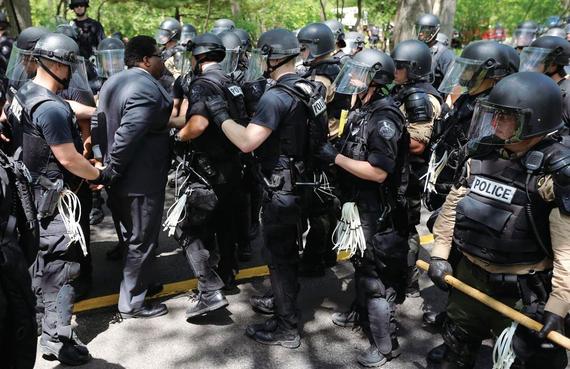Rev. Charles Williams II, escorted for arrest by Oakwood, Illinois Police while sitting in with McDonald Workers. Photo Courtesy: Joe Jones
The Republican-led legislature and the Governor of Michigan passed a watered-down anti-democratic semblance of a bill to increase the minimum wage recently, and critics wonder why no one is jumping for joy. Well turns out in this legislation there are some serious flaws that basically treat the low-wage worker with serious disrespect.
First, Public Act 138 of 2014 gradually raises Michigan's minimum wage from $7.40 per hour to $9.25 per hour by 2018. President Obama set the standard at $10.10 when he signed an executive order to raise the minimum wage of all federal contract employees.
Secondly, the legislation says that all future minimum wage raises will be tied to inflation. So that means eggs, milk, gas, rent and etc. gets just to the point where I can't afford it and then the legislature will vote to raise the minimum wage to the point where a low-wage worker barely can afford it.
Lastly, Public Act 138 supposedly kills the 100s of 1000s of signatures of those who signed petitions asking for the question to get on the ballot of whether the wage should be raised. So their voice and effort doesn't matter? Why is it that this legislature and Governor Rick Snyder specialize in trying to silence voices of Michigan? From emergency management to right to work, women rights and now minimum wage?
Minimum-wage workers deserve more respect. In many of my conversations with good old working- and middle-class American, I am often challenged on why l lend my support for low-wage fast food workers. Usually I get a few quips thrown back at me that sound like this:
"They're working in fast food. What do you expect?"
"They should go to college."
"They only make burgers and fries."
"They are just kids."
"Those young kids are lazy."
It's almost like people have a certain disdain for the $7.00-an-hour worker. That automatically categorizes them as some lazy person who doesn't have a family to feed or bills to pay, as if they decided to work at a fast food restaurant cause it's an easy job, and they are trying to get out of going to work.
The fact is, they work in fast food for the same reasons everybody else works in any other profession: to make a living. The sad part of this story is that although they're working to make a living, most often many of them still live on some type of welfare or government assistance, according to the labor center at Berkeley:
"More than half (52 percent) of the families of front-line fast food workers are enrolled in one or more public programs, compared to 25 percent of the workforce as a whole."
Secondly, if the wage of the low-wage worker increases, it grows the economy. Who does that affect? Everybody. More taxes being paid to help the public sector worker, more deposits being made in the bank to help Wall Street and more cars being purchased helps the car manufacturer. Grow the wage, grow the worker. Grow the worker, grow the economy. A rising tide lifts all boats.
This is outlined In a report from the Center for Economic and Policy Research:
The minimum wage generally was increased in step with productivity over these years. This led to 170 percent increase in the real value of the minimum wage over the years from 1948 to 1968. If this pattern of wage increases for those at the bottom was supposed to stifle growth, the economy didn't get the message. Growth averaged 4.0 percent annually from 1947 to 1969 and the unemployment rate for the year 1969 averaged less than 4.0 percent.
Lastly we must not forget that there are standards that we should always be mindful of. Never should we allow greed to be a healthy or American standard. We are the land of plenty, and no one should go with out. We are also a country where there is no limitation to how far you can go. However, there is never a limitation on how much we can give. We must be careful that as a country we don't deepen the divide in income disparity or that we don't further drive a divide between the have and have nots. Simply put: We can do better. CEOs like McDonald's Don Thompson makes a $13.8 million compensation package while workers are making an average $8.00. It should be clear to anyone that it's not fair, and it's not right.
So in the tradition of Dr. King who penned the letter from a Birmingham jail, this is the time that we must stand with those who need us the most. The fire is in low-wage worker disparity. We must all jump on the fire truck of justice and stand with these workers. Next time you drive up to the driveway of a fast food restaurant don't look down, but reach down, and let's help pull them up.
To follow Rev. Charles Williams II go to Therevcw.com

